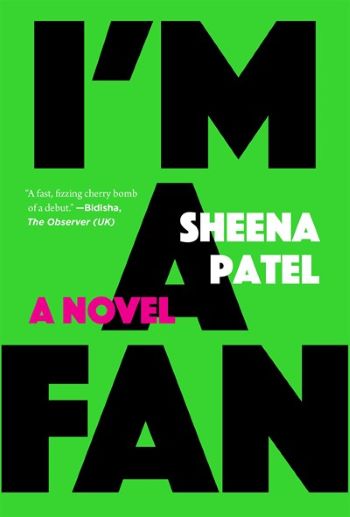[ad_1]
Beyoncé’s 2020 musical Black Is King was heralded as an example of “Black excellence,” featuring top-notch talents like Naomi Campbell, Lupita Nyong’o, Jay-Z, and Kelly Rowland. While discussing the musical on Good Morning America, Beyoncé explained why she hired these celebrated performers: “the word Black…has always meant inspiration and love and strength and beauty to me…Black is King means Black is regal.” It also illustrates a problem. Conflating the word Black with exceptional qualities exemplifies society’s need to legitimize Black existence. In an interview with Dazed Digital, debut author Sheena Patel explains how she combats this concern in her new novel, I’m a Fan: “The veneer of respectability and politeness disguises violence and the often shameful ways we are with one another. My narrator is on the sharp end of the world, she’s very angry, very dispossessed, an observer on the internet, a fan.”
Patel’s unnamed, average protagonist is exceptional only in her blunt rants about race and power dynamics that come across like a punch in the face. Otherwise, the narrator swims in mediocrity: she desires to be an artist but she can’t draw. She wants to write but she doesn’t have the skill. She spends her days stalking a woman who is copulating with her older lover, and she has an additional younger boyfriend, whom she berates in public. Yet she still deserves to coexist in a society that believes she has to be special to matter. Isn’t every human being, regardless of race, endowed with the birthright to take up space on this earth? Once upon a time, our planet didn’t have borders.
As a second-generation immigrant, the narrator internalizes her diminished status. Patel introduces her as a spectator, Instagram-stalking the other woman her lover is seeing. Like the narrator’s older lover, the other woman is white. The narrator is never in the other woman’s presence, so we never hear the other woman’s voice. However, the other woman posts one-word responses to friends’ Instagram posts, and polite thank yous to followers who visit Terroir, their luxury shop. In comparison, the narrator’s voice is angry and unhinged. The lack of punctuation demonstrates the compulsive urgency with which she narrates. The other woman lives comfortably. Thus she can modulate her responses by crafting pleasant sentences. The narrator, who struggles to make ends meet, is bursting at the seams with language. Her words overflow onto the 203 pages of I’m a Fan, whereas the other woman doesn’t have any grievances to verbalize.
The narrator is unsympathetic, bordering on criminal, as her internet obsession escalates into stalking the other woman’s friends and family. The other woman, who has a boyfriend in addition to her older lover, disguises herself as an angelic, Victorian housewife: she is thoroughly versed in the domestic arts and can sing and paint. In contrast, the narrator describes her sexual desires with unashamed vividness. She only fits into “pre-carved spaces” and wouldn’t know how to curate a house. She doesn’t have the monetary allowance to do so. The persistent, yet antiquated perspective that women should be homemakers emphasizes how our cultural views and tastes are based in whiteness. Black women weren’t homemakers; they were slaves. Lacking the privilege of whiteness, the narrator is adrift. However, the other woman ignores her racial advantage. She delights followers and infuriates the narrator by posting about her curated garden. Ignorant of her ancestors’ long history of colonial violence, she disguises the once-pillaged land with flowers and expensive seeds. To her, racism is a thing of the long-ago past. When she hears about George Floyd’s murder, she is “saddened by America,” blissfully unaware of America’s ongoing structural racism.
Covert racism plays out in the story’s central relationship: the narrator’s aged white lover treats the narrator as a service provider. According to him, the service is free: he doesn’t have to pay for Uber or greet her in public. The narrator recognizes their unequal relationship is rooted in colonization. Specifically, Europe’s colonization of India. Centuries ago, Europe took control of India to seize the country’s goods. In the present, the narrator’s lover wants to possess the narrator to access her body. He also sees the narrator as a mechanism through which he can feel needed and important. The more the narrator desires and contacts her lover, the more he withdraws his affection, banking her need to fuel his sense of importance. The older lover similarly manipulates language. On his cellphone, he has the unnamed narrator in his contact list as “Laura National Trust.” This simple act of naming puts the narrator on the margins of her lover’s life, which mirrors her marginalized status in society. He also talks about his other sexual relationships with the narrator in detail. The narrator doesn’t hold the same status as the other women. Like a prostitute, she is an occasional lay, someone to be talked at rather than engaged in conversation. But the narrator talks back. When he mistreats or offends her, she castigates her older sex partner by calling him stupid, a bastard, or other expletives. Most notably, she describes him as a misogynist, and he, unable to deny the strength of her accusation, humbly agrees.
Patel fights against the narrator’s marginalized status by imbuing her with a powerful, shattering voice. Instead of side-stepping around race and sex, the narrator bluntly confesses her desires to the reader. In an interview with Lucy Writers, Patel introduced the term “faction” to encompass her narrator’s mode of expression: she combines diary-like accounts with insightful statements. In a time where we need to speak openly about racial and sexual violence, Patel’s debut implores readers to wake the hell up.

FICTION
by Sheena Patel
Graywolf Press
Published on September 5, 2023

[ad_2]
Source link
